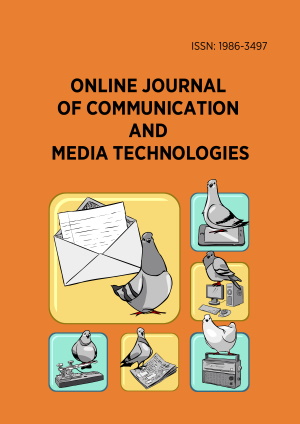Research Article
Social and Traditional Mainstream Media of Communication: Synergy and Variance Perspective
More Detail
1 Taraba State University, Nigeria* Corresponding Author
Online Journal of Communication and Media Technologies, 7(4), October 2017, 132-140, https://doi.org/10.29333/ojcmt/2614
OPEN ACCESS 4917 Views 2467 Downloads
ABSTRACT
Social media are computer mediated tools that allow people to create, share or exchange information, ideas, pictures/videos in implicit communities and networks such as Facebook, Twitter, Baddo, Instagram among others. Whereas Traditional Media refer to those media that communicates identical messages in a one-way route to very large mass audiences, which are assumed to be homogeneous. Social media is at variance with Traditional media in production of media content; whereby social media content have now become more generally dispersed throughout the population, rather than restricted to media professionals, and there is more accessibility, quality and interactivity. Social media and the Traditional media share a relationship in advertisement, entertainment and news among others. The study postulates that although social media have come to stay, the traditional media will continue to strive in complimenting the social media
CITATION (APA)
Apuke, O. D. (2017). Social and Traditional Mainstream Media of Communication: Synergy and Variance Perspective. Online Journal of Communication and Media Technologies, 7(4), 132-140. https://doi.org/10.29333/ojcmt/2614
REFERENCES
- Asemah, E. (2011). Principles and practice of Mass Communication. Jos: Great Future Press.
- Buettner, R. (2016) “Getting a Job via Career oriented Social networking sites”: The weakness of Ties. 49th Annual International Conference on systems sciences. Kauai, Hawaii: IEEEE. https://doi.org/10.13140/RG. 2.1.3249.2241
- Kaplan A. M., & Haenlein M. (2010). Users of the world, unite! The challenges and opportunities of social media. Business Horizons, 53(1), 6-61.
- Kietzmann, J. H., Hermkens, K., McCarthy, I. P., & Silvestre, B. S. (2011). Social media? Get serious! Understanding the functional building blocks of social media. Business Horizons, 54(3), 241-251.
- Kim, Y., Kim, M., & Kim, K. (2010). Factors influencing the adoption of social media in perspective of information needs.
- Social Media. (2013). Social media. In Wikipedia. Retrieved January 29, 2014 from http://en.wikipedia.org/wiki/Social_media

 The articles published in this journal are licensed under the CC-BY Creative Commons Attribution International License.
The articles published in this journal are licensed under the CC-BY Creative Commons Attribution International License.